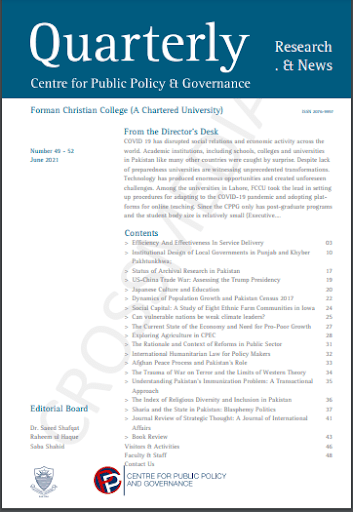
Subject/Topic: Education, Health Policy, Media & ICT, Foreign Affairs, Economic Development, Peace & Conflict Resolution, Democracy & Governance
Intro\Abstracts: COVID 19 has disrupted social relations and economic activity across the world. Academic institutions, including schools, colleges and universities in Pakistan like many other countries were caught by surprise. Despite lack of preparedness universities are witnessing unprecedented transformations. Technology has produced enormous opportunities and created unforeseen challenges. Among the universities in Lahore, FCCU took the lead in setting up procedures for adapting to the COVID-19 pandemic and adopting platforms for online teaching. Since the CPPG only has post-graduate programs and the student body size is relatively small (Executive Masters, MPhil and PhD), it quickly embraced ZOOM for its programs. We swiftly converted our well established Seminar and Policy dialogues series into Webinar series—around 12 have been conducted so far, highlighting public policy concerns ranging from the management of the global health crisis, to the significance of media freedom. Several others are lined up in the coming weeks as we continue to commit our efforts towards evidence-based policy advocacy.
Besides, enriching its academic programs, teaching, research and trainings, over the years CPPG has been building and expanding its Think Tank functions by connecting with other national and international Think Tanks. In November (10-12), 2019, the Director CPPG, participated in Asia Pacific Think Tanks Summit, at Bangkok, Thailand. This is an initiative and global out reach program stemming from the Think Tanks and Civil Societies Program at the Lauder Institute for Management and International Studies, University of Pennsylvania. It has a Think Tank Membership of about 181 from across the globe and I was able to register CPPG in 2018. Since then, the CPPG has actively participated in Virtual Global Think Tanks Town Hall Meetings, the Director nominated Ms. Saba Shahid, Research Fellow to participate in the meetings and serve as Focal Person. This helped CPPG build connections with other think tanks internationally, including the Observer Research Foundation (ORF) a leading Think Tank in India and we contributed towards the publication of their monograph “Rebooting the World: Six Months of COVID- 19” (September 2020).
In 2020 we applied to the International Center on Nonviolent Conflict for a fellowship and were able to secure it. Dr. Rabia Chaudhry is the Focal Person and was nominated to attend a three-day online program – titled Reflecting on Peace Building and Sustaining Peace – on behalf of the CPPG. Four institutions, namely; Dag Hammarskjöld Foundation, the Global Partnership for the Prevention of Armed Conflict, Peace Direct and the United Nations Peacebuilding Support Office, organized this. Dr. Chauhdry, attended and contributed to panels on Sustaining peace on the ground – the role of civil society in peacebuilding; Partnerships with the United Nations and others; Civil society’s role in building and sustaining peace; and additional relevant topics. This virtual consultation was attended by academics and civil society organizations from sixty different countries.
Earlier in 2019 the CPPG signed an MOU with George Mason University, Virginia, USA and in January 2021, Dr. Mark J. Rozelle Associate Dean gave a webinar on “The Meaning of January 6 and the Biden Transition”. The CPPG continues to work closely with the Urban Unit, Government of Punjab and Dr. Imdad Hussain is the focal person for that initiative. In addition, Dr. Ali Saleem wounded up the project on Local Government with GTZ and the CPPG published the final report titled “Effective Implementation of the PLGA 2019: Lessons Learnt from the Implementation of the PLGA 2013.”
The CPPG retains the distinction of being the leading academic and actionable policy research Think Tank and publisher at FCCU. Despite, the pandemic, we have produced two policy related researches on two critical issues including a policy brief titled Pathways to Governance and Civil Service Reform in Pakistan: Federal, Provincial and Local (April, 2020) and a discussion paper on Bridging the Gender and Digital Divide in Post COVID-19 Pakistan: Empowering Women Through ICT (March 2021). Further researches are in the pipeline for the current year.
Finally, it gives me pleasure to share with you that since 2008 we have been publishing the Quarterly Research & News magazine. Raheem ul Haque has been the dynamic team leader ably assisted by Saba Shahid, since 2016 while, I have played only the supervisory role. Over the years it has performed a very useful function of sharing the views of our guest speakers, occasionally publishing a research article, policy brief and consultative dialogues and their reports. Now, the CPPG faculty is ready to launch a policy research journal, therefore, we have decided that from this year the CPPG students will edit the Quarterly. In that spirit the current issue carries two articles by students who have completed their MPhil in Public Policy. Moreover I would like to acknowledge our MPhil students Shahwar Asif, Moazma Ashraf, Hurmat Nadeem, Momna Malik, Ehtisham Akhtar, Surteel Siddiqui and Sobia Mustafa for the assistance they have given with this edition. The CPPG faculty members will advise and oversee this transition of Quarterly to promote a culture of research, deliberation and tolerance of opposing views in an academic environment. We hope the students will welcome this opportunity, enabling the faculty to consolidate the Think Tank functions of CPPG.
Citations

